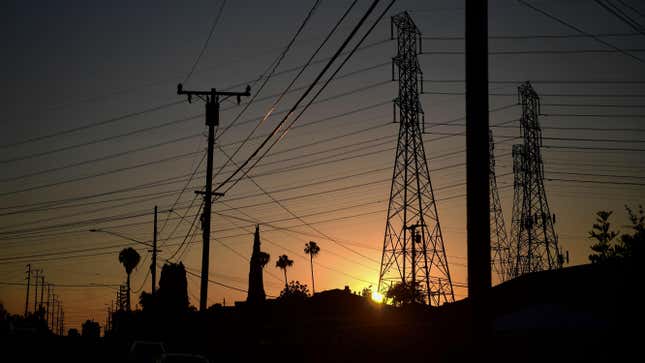
It’s incredibly, record-breakingly, worryingly hot in multiple states right now. A heat wave sweeping over the U.S. this week is felling temperature records left and right. Grid operators are begging with customers to conserve energy to avoid blackouts and wildfires are spreading. The whole ordeal foretells our sweaty, scary future.
It’s actually kind of difficult to grasp how serious and how widespread this heat wave is. For a little context: Doctors in Arizona and Nevada warned this week that people could get burned on hot asphalt, sand, and sidewalks as temperatures soared. Temperatures in Death Valley reached 125 degrees Fahrenheit (51.7 degrees Celsius) this week and temperatures are expected to be even hotter on Thursday, just a few degrees off the all-time hottest temperature on Earth set at the same site last year. The extreme heat and warnings didn’t keep people from showing up to visit the park to get a taste of the heat (or maybe to get used to what our new climate dystopia feels like).
A number of cities have already seen their hottest days ever recorded at any time of year. Among them are Salt Lake City, which hit 107 degrees Fahrenheit (41.7 degrees Celsius) on Tuesday. Billings, Montana and Casper, Wyoming also tied all-time high records at 108 degrees Fahrenheit (42.2 Celsius) and 101 degrees Fahrenheit (38.3 degrees Celsius) respectively. Last Vegas, meanwhile, just missed setting an all-time high as did Phoenix. The latter, though, did set an all-time hot low temperature; the temperature there only bottomed out at an unbearable 90 degrees (32.2 degrees Celsius) on Wednesday, smashing its former record.
The West is nowhere close to out of the woods yet. Around 200 heat records across the country are expected to be tied or broken this week, while 40 million people are expected to feel temperatures 100 degrees Fahrenheit (37.8 degrees Celsius) or more in the next few days. On Thursday, the National Weather Service issued a one-two punch of warnings of excessive heat in multiple states while also warning about wildfires in Arizona, California, Nevada, and Utah. Those would add to the fires already raging in Montana, Utah, Colorado, and California. Since the region is already going through a months-long drought, this prolonged heat wave will only serve to further dry out the West and create more tinderbox-like conditions.
“We’re still a long way out from the peak of the wildfire season and the peak of the dry season,” Daniel Swain, a climate scientist at the University of California, Los Angeles, told the New York Times. “Things are likely to get worse before they get better.”
All this heat is putting a huge strain on grid operators as people crank up the air conditioning in an effort to stave off heat-related illness and generally not overheat. In California, the state’s power operator is asking residents to turn off lights and appliances and keep thermostats a little higher than usual for a few hours on Thursday night amid worries that the heat wave could stress the grid. Californians went through rolling blackouts during a big heat wave last summer. The state’s utilities also implemented preemptive blackouts last year and the year before during peak wildfire weather—downed power lines have sparked many of California’s worst fires—meaning this is unfortunately becoming a regular occurrence. (Oregon has also adopted similar measures for this year.)
Heat is also forcing Texas’ grid operator to make the same request. The state suffered historic and deadly blackouts due to freezing conditions in February, and now ERCOT has asked residents this week to reduce power as much as possible to keep the grid going down again. (Nice going, ERCOT.)
Searing asphalt, record-breaking heat, overtaxed electric grids, raging wildfires—if you need any proof that the climate crisis has arrived, look no further.